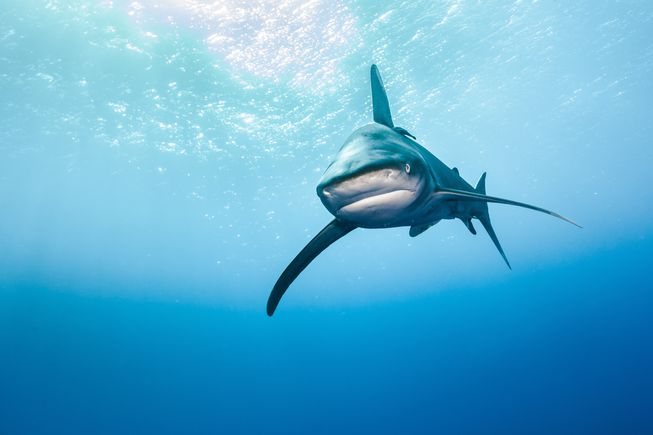Animal carcass dumping and improper conduct by tourists top a list of probable causes of the recent shark attacks near the Red Sea resort town Sharm al-Sheikh, according to conclusions drawn from a six-day investigation by teams of Egyptian and American scientists.
Dr. Sherif Fattouh and Dr. George Burgess led the research units.
Governor of South Sinai, Mohamed Abdel Fadil Shousha, speaking at a press conference on Sunday night, explained the preliminary measures to be taken in light of the investigative findings.
In an interview with Al-Masry Al-Youm, Dr. Burgess said scientists would need, however, to continue their research to reach a more comprehensive conclusion. “We had a timeline. The health and safety of a lot of people need to be taken into consideration. That is first and foremost. There are also economic considerations,” he added.
Burgess believes the capture-and-kill method employed by Egyptian authorities in the first few days after the initial attacks was a normal gut reaction for a country dealing with an unprecedented spate of attacks. “The group [authorities and scientists] now overwhelmingly believes that capturing sharks is not the answer; and that biodiversity [including the presence of sharks] is very important for our seas. The important thing is to assess all the factors involved.”
As expected, the report mainly attributes the "change in shark behavior" to innapropriate practices by locals.
The main culprit were those who illegally dumped sheep carcasses off the shores of Sharm al-Sheikh, which may have given the sharks a ready source of food for many days. When the source of food ran out, it is speculated that the sharks required another source of food as readily available as the sheep.
Illegal shark baiting and over-fishing are all mentioned as other possible causes in the experts’ report. The topographical nature of the Gulf of Aqaba seabed, as well the unusually warm water temperature this time of the year may have helped create a more suitable environment for the unseasonable presence of certain sharks in the area.
“The interaction and overlapping of all these different factors may have caused a perfect storm that led to the change in shark behavior that may have caused the attacks,” said Burgess.
The governor has decided to set up watchtowers on the beaches with trained divers, first-aid crews and zodiac boats.
He has also decided to create a campaign to raise awareness among visitors regarding proper procedures and behavior aboard dive boats and around marine life in general. The governorate will conform with international marine standards and place penalties on visitors or operators who violate any of the new measures.
“Hotels and diving operators will be responsible to us for administering the individual penalties when visitors are engaged in activities under their supervision,” said Shousha. The governorate, for its part, will take it upon itself to levy larger penalties on tourism operators and commercial boats that perpetrate violations. The penalties may be financial, or lead to permit invalidations.
While they are still studying the possibility of setting up nets around some of the swimming areas, Shousha stressed the governorate “will make sure to not activate any measures that will have a negative effect on the environment."
As per the expert recommendations, certain beaches and swimming areas will be closed for swimming and snorkeling until further notice, while others maybe reopened “within two or three three days.” The governor added that some hotel-front beaches might be closed for swimming indefinitely, “if they are not considered safe for swimmers.”
The governorate will provide these hotels with alternative beaches for visitor use.
Shousha and Burgess stressed that none of the measures offer a 100 percent guarantee that no shark attacks will recur, however they are measures to make sure the environment is as safe as possible for visitors.
“People need to understand that going into the sea is like going into the wild, there’s a certain degree of risk involved no matter what," said Burgess. "You don’t go on a safari in the Serengeti without taking your precautions against lions.”
But area officials contend the recent weeks have been a learning experience that better equips authorities for the future.
“We might have been mistaken before, but this is the first time we have dealt with a situation like this," conceded Shousha. "I admit we were at fault before, and now we’re correcting these faults."




